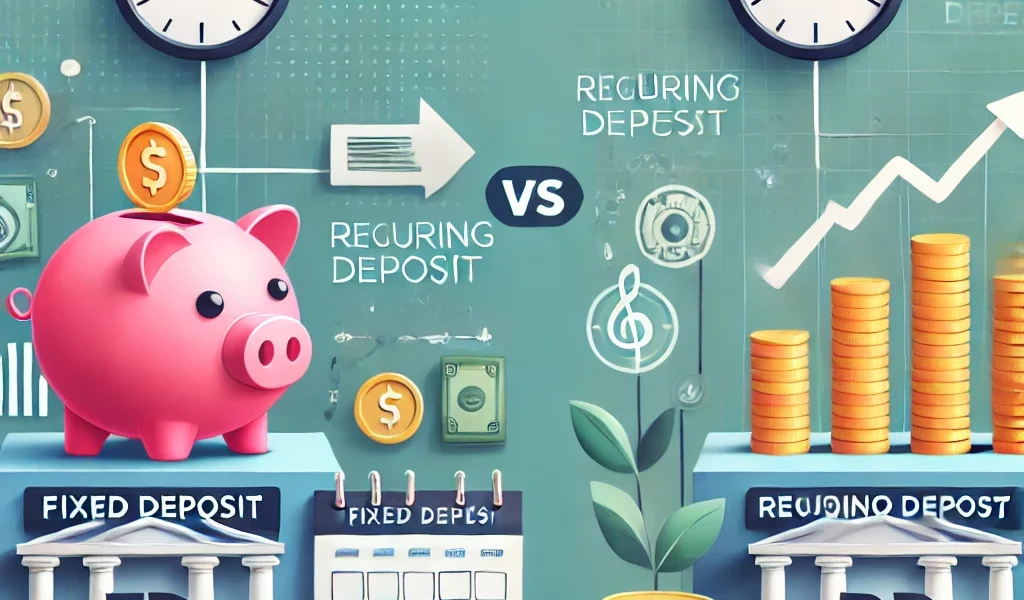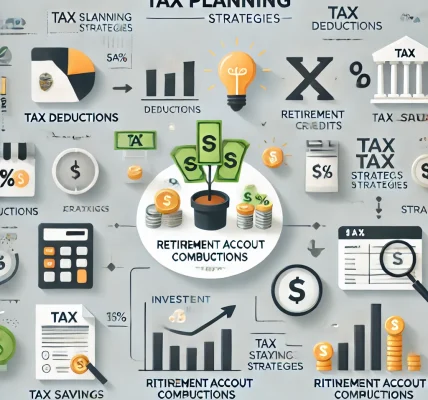When it comes to safe investment options, Fixed Deposits (FDs) and Recurring Deposits (RDs) are among the most popular choices. Both investment options are offered by banks and financial institutions, providing a secure way to grow your savings with guaranteed returns. However, choosing between an FD and an RD depends on various factors such as financial goals, investment horizon, and liquidity needs.
In this article, we will compare Fixed Deposits and Recurring Deposits in detail, helping you determine which one suits your financial needs the best.
What is a Fixed Deposit (FD)?
A Fixed Deposit (FD) is an investment scheme where you deposit a lump sum amount with a bank or financial institution for a fixed period at a predetermined interest rate. At the end of the tenure, you receive the principal amount along with the accumulated interest.
Key Features of Fixed Deposit:
- One-time lump sum investment.
- Fixed tenure ranging from 7 days to 10 years.
- Higher interest rates compared to a savings account.
- Option for monthly, quarterly, or annual interest payouts.
- Premature withdrawal is possible but with penalty charges.
- Assured returns with minimal risk.
What is a Recurring Deposit (RD)?
A Recurring Deposit (RD) is a disciplined savings plan where you invest a fixed amount every month for a specific tenure. The bank pays interest on the cumulative balance, and at the end of the tenure, you receive the total savings along with the accrued interest.
Key Features of Recurring Deposit:
- Fixed monthly contributions.
- Tenure ranges from 6 months to 10 years.
- Interest rates similar to FDs but slightly lower.
- Suitable for salaried individuals and disciplined savers.
- Premature withdrawal is allowed with penalties.
- Guaranteed returns and low risk.
Key Differences Between Fixed Deposit and Recurring Deposit
| Feature | Fixed Deposit (FD) | Recurring Deposit (RD) |
|---|---|---|
| Investment Type | One-time lump sum investment | Monthly fixed investments |
| Tenure | 7 days to 10 years | 6 months to 10 years |
| Interest Rate | Generally higher | Slightly lower than FDs |
| Payout Options | Monthly, quarterly, or at maturity | Paid at maturity |
| Liquidity | Premature withdrawal allowed with penalty | Premature withdrawal allowed with penalty |
| Best Suited For | Individuals with surplus funds | Individuals looking to build savings over time |
Pros and Cons of Fixed Deposit and Recurring Deposit
Advantages of Fixed Deposits:
✔ Higher interest rates compared to RDs and savings accounts. ✔ Flexibility in tenure and payout options. ✔ Suitable for lump sum investments and long-term growth. ✔ Safe and secure investment with guaranteed returns.
Disadvantages of Fixed Deposits:
✖ Requires a one-time lump sum investment, which may not be feasible for all. ✖ Premature withdrawal attracts penalties and lower interest rates. ✖ Lower liquidity compared to a savings account.
Advantages of Recurring Deposits:
✔ Encourages systematic saving habits. ✔ Ideal for individuals with regular income. ✔ Lower investment requirement compared to FDs. ✔ Safe and guaranteed returns over time.
Disadvantages of Recurring Deposits:
✖ Lower interest rates compared to FDs. ✖ Monthly contributions must be made regularly. ✖ Premature closure results in penalties.
Who Should Choose Fixed Deposit?
A Fixed Deposit is ideal for individuals who:
- Have a lump sum amount to invest.
- Prefer higher interest rates.
- Want flexibility in choosing tenure and payout options.
- Are looking for a safe and secure investment option with guaranteed returns.
Who Should Choose Recurring Deposit?
A Recurring Deposit is ideal for individuals who:
- Prefer saving small amounts regularly.
- Have a fixed monthly income and want to build savings over time.
- Want a disciplined approach to investing.
- Are looking for a safe and steady return on investment.
Tax Implications on FDs and RDs
- Fixed Deposits: The interest earned on FDs is taxable under “Income from Other Sources.” If the interest earned exceeds ₹40,000 (₹50,000 for senior citizens) in a financial year, TDS (Tax Deducted at Source) is deducted at 10%.
- Recurring Deposits: Unlike earlier tax-free RDs, the interest earned on RDs is now taxable and subject to TDS if it exceeds ₹40,000 (₹50,000 for senior citizens) in a year.
Which One Should You Choose?
- Choose FD if: You have surplus funds and want higher returns with flexibility in interest payouts.
- Choose RD if: You want to develop a habit of regular savings and build a corpus over time with minimal financial strain.
Final Verdict
Both Fixed Deposits and Recurring Deposits offer secure and guaranteed returns, making them ideal for risk-averse investors. If you have a lump sum amount, an FD provides better returns and flexibility. However, if you prefer disciplined monthly savings, an RD is a great option. Your choice should depend on your financial goals, liquidity needs, and investment capacity.
Disclaimer: This article is for informational purposes only and should not be considered financial advice. Please consult a financial expert before making any investment decisions.




